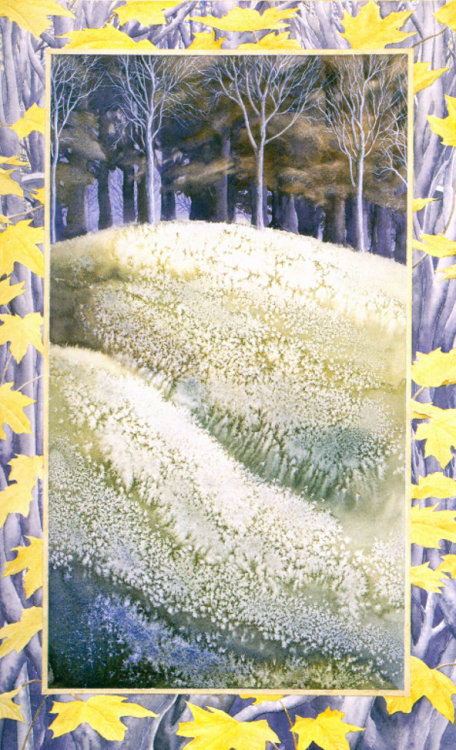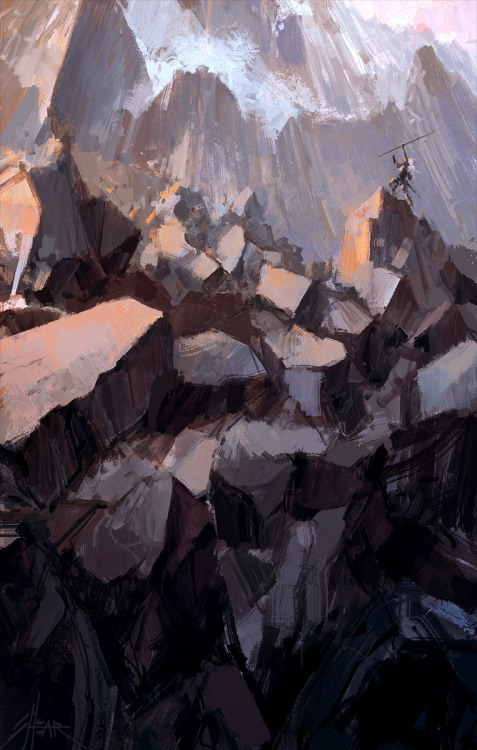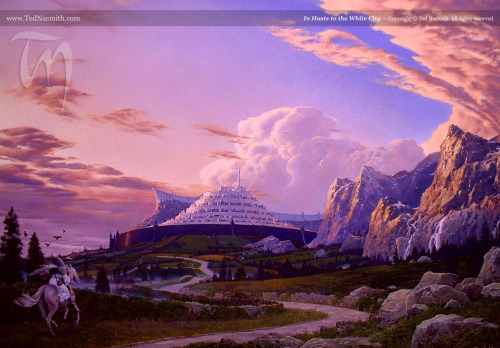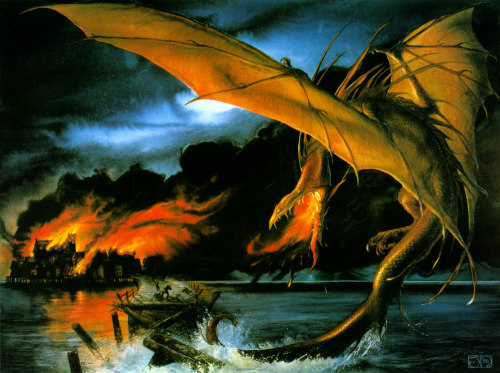#jrr tolkien
The Burning of the Ships; art by Ted Nasmith
But when they were landed, Maedhros the eldest of his sons, and on a time the friend of Fingon ere Morgoth’s lies came between, spoke to Fëanor, saying: ‘Now what ships and rowers will you spare to return, and whom shall they bear hither first? Fingon the valiant?’
Then Fëanor laughed as one fey, and he cried: ‘None and none! What I have left behind I count now no loss; needless baggage on the road it has proved. Let those that cursed my name, curse me still, and whine their way back to the cages of the Valar! Let the ships burn!’ Then Maedhros alone stood aside, but Fëanor caused fire to be set to the white ships of the Teleri. So in that place which was called Losgar at the outlet of the Firth of Drengist ended the fairest vessels that ever sailed the sea, in a great burning, bright and terrible. And Fingolfin and his people saw the light afar off, red beneath the clouds; and they knew that they were betrayed. This was the firstfruits of the Kinslaying and the Doom of the Noldor.
— J.R.R. Tolkien, The Silmarillion, “Of the Flight of the Noldor”
Post link
I do not feel quite ‘real’ or whole, and in a sense there is no one to talk to. (You share this, of course, especially in the matter of letters.) Since I came of age, and our 3 years separation was ended, we had shared all joys and griefs, and all opinions (in agreement or otherwise), so that I still often find myself thinking ‘I must tell Edith about this’ – and then suddenly I feel like a castaway left on a barren island under a heedless sky after the loss of a great ship. I remember trying to tell Marjorie Incledon this feeling, when I was not yet thirteen after the death of my mother (Nov. 9. 1904), and vainly waving a hand at the sky saying ‘it is so empty and cold’. And again I remember after the death of Fr Francis my ‘second father’ (at 77 in 1934), saying to C. S. Lewis: ‘I feel like a lost survivor into a new alien world after the real world has passed away.’ But of course these griefs however poignant (especially the first) came in youth with life and work still unfolding.
In 1904 we (Hilary & I) had the sudden miraculous experience of Fr Francis’ love and care and humour – and only 5 years later (the equiv. of 20 years experience in later life) I met the Lúthien Tinúviel of my own personal ‘romance’ with her long dark hair, fair face and starry eyes, and beautiful voice. And in 1934 she was still with me, and her beautiful children. But now she has gone before Beren, leaving him indeed one-handed, but he has no power to move the inexorable Mandos, and there is no Dor Gyrth i chuinar, the Land of the Dead that Live, in this Fallen Kingdom of Arda, where the servants of Morgoth are worshipped.
J.R.R. Tolkien in a letter to Michael Tolkien on the death of his wife, Edith Tolkien. (Jan 24, 1972)
–The Letters of J.R.R. Tolkien, 332
Post link
“Thus spake Mandos in prophecy, when the Gods sat in judgement in Valinor, and the rumour of his words was whispered among all the Elves of the West. When the world is old and the Powers grow weary, then Morgoth, seeing that the guard sleepeth, shall come back through the Door of Night out of the Timeless Void; and he shall destroy the Sun and Moon. But Eärendel shall descend upon him as a white and searing flame and drive him from the airs. Then shall the Last Battle be gathered on the fields of Valinor. In that day Tulkas shall strive with Morgoth, and on his right hand shall be Fionwë, and on his left Túrin Turambar, son of Húrin, coming from the halls of Mandos; and the black sword of Túrin shall deal unto Morgoth his death and final end; and so shall the children of Húrin and all Men be avenged.
Thereafter shall Earth be broken and re-made, and the Silmarils shall be recovered out of Air and Earth and Sea; for Eärendel shall descend and surrender that flame which he hath had in keeping. Then Fëanor shall take the Three Jewels and bear them to Yavanna Palúrien; and she will break them and with their fire rekindle the Two Trees, and a great light shall come forth. And the Mountains of Valinor shall be levelled, so that the Light shall go out over all the world. In that light the Gods will grow young again, and the Elves awake and all their dead arise, and the purpose of Ilúvatar be fulfilled concerning them. But of Men in that day the prophecy of Mandos doth not speak, and no Man it names, save Túrin only, and to him a place is given among the sons of the Valar.”
—J.R.R. Tolkien, The History of Middle-earth V: The Lost Road and Other Writings, “Quenta Silmarillion”
“The appearance of Túrin at the end remains profoundly mysterious…. it is said that Túrin is named among ‘the sons of the Gods’ rather than among the Gods, and also that he comes ‘from the halls of Mandos’ to the final battle; about which I can say no more than that Túrin Turambar, though a mortal Man, did not go, as do the race of Men, to a fate beyond the world.”
—Christopher Tolkien, The History of Middle-earth IV: The Shaping of Middle-earth, “The Quenta”
Post link
Now Aragorn knelt beside Faramir, and held a hand upon his brow. And those that watched felt that some great struggle was going on. For Aragorn’s face grew grey with weariness; and ever and anon he called the name of Faramir, but each time more faintly to their hearing, as if Aragorn himself was removed from them, and walked afar in some dark vale, calling for one that was lost.
And at last Bergil came running in, and he bore six leaves in a cloth. ‘It is kingsfoil, Sir,’ he said; 'but not fresh, I fear. It must have been culled two weeks ago at the least. I hope it will serve, Sir?’ Then looking at Faramir he burst into tears.
But Aragorn smiled. 'It will serve,’ he said. 'The worst is now over. Stay and be comforted!’ Then taking two leaves, he laid them on his hands and breathed on them, and then he crushed them, and straightway a living freshness filled the room, as if the air itself awoke and tingled, sparkling with joy. And then he cast the leaves into the bowls of steaming water that were brought to him, and at once all hearts were lightened. For the fragrance that came to each was like a memory of dewy mornings of unshadowed sun in some land of which the fair world in Spring is itself but a fleeting memory. But Aragorn stood up as one refreshed, and his eyes smiled as he held a bowl before Faramir’s dreaming face.
'Well now! Who would have believed it?’ said Ioreth to a woman that stood beside her. 'The weed is better than I thought. It reminds me of the roses of Imloth Melui when I was a lass, and no king could ask for better.’
Suddenly Faramir stirred, and he opened his eyes, and he looked on Aragorn who bent over him; and a light of knowledge and love was kindled in his eyes, and he spoke softly. 'My lord, you called me. I come. What does the king command?’
'Walk no more in the shadows, but awake!’ said Aragorn. 'You are weary. Rest a while, and take food, and be ready when I return.’
'I will, lord,’ said Faramir. 'For who would lie idle when the king has returned?’
Post link
“So it came to pass that when the light of Valinor failed, for ever as the Noldor thought, she joined the rebellion against the Valar who commanded them to stay; and once she had set foot upon that road of exile, she would not relent, but rejected the last message of the Valar, and came under the Doom of Mandos. Even after the merciless assault upon the Teleri and the rape of their ships, though she fought fiercely against Fëanor in defence of her mother’s kin, she did not turn back. Her pride was unwilling to return, a defeated suppliant for pardon; but now she burned with desire to follow Fëanor with her anger to whatever lands he might come, and to thwart him in all ways that she could.
Pride still moved her when, at the end of the Elder Days after the final overthrow of Morgoth, she refused the pardon of the Valar for all who had fought against him, and remained in Middle-earth. It was not until two long ages more had passed, when at last all that she had desired in her youth came to her hand, the Ring of Power and the dominion of Middle-earth of which she had dreamed, that her wisdom was full grown and she rejected it, and passing the last test departed from Middle-earth for ever.”
—J.R.R. Tolkien, The History of Middle-earth XII: The Peoples of Middle-earth, Chapter XI “The Shibboleth of Fëanor”(Galadriel)
Post link
“As they passed beyond the green field of the Tongue, the trees drew down to the river’s brink. Here and there golden leaves tossed and floated on the rippling stream. The air was very bright and still, and there was a silence, except for the high distant song of larks.
They turned a sharp bend in the river, and there, sailing proudly down the stream toward them, they saw a swan of great size. The water rippled on either side of the white breast beneath its curving neck. Its beak shone like burnished gold, and its eyes glinted like jet set in yellow stones; its huge white wings were half lifted. A music came down the river as it drew nearer; and suddenly they perceived that it was a ship, wrought and carved with elven-skill in the likeness of a bird. Two elves clad in white steered it with black paddles. In the midst of the vessel sat Celeborn, and behind him stood Galadriel, tall and white; a circlet of golden flowers was in her hair, and in her hand she held a harp, and she sang. Sad and sweet was the sound of her voice in the cool clear air:
I sang of leaves, of leaves of gold, and leaves of gold there grew:
Of wind I sang, a wind there came and in the branches blew.
Beyond the Sun, beyond the Moon, the foam was on the Sea,
And by the strand of Ilmarin there grew a golden Tree.
Beneath the stars of Ever-eve in Eldamar it shone,
In Eldamar beside the walls of Elven Tirion.
There long the golden leaves have grown upon the branching years,
While here beyond the Sundering Seas now fall the Elven-tears.
O Lórien! The Winter comes, the bare and leafless Day;
The leaves are falling in the stream, the River flows away.
O Lórien! Too long I have dwelt upon this Hither Shore
And in a fading crown have twined the golden elanor.
But if of ships I now should sing, what ship would come to me,
What ship would bear me ever back across so wide a Sea?”
Post link
“‘I wished to be loved by another,’ she answered. 'But I desire no man’s pity.’
'That I know,’ he said. 'You desired to have the love of the Lord Aragorn. Because he was high and puissant, and you wished to have renown and glory and to be lifted far above the mean things that crawl on the earth. And as a great captain may to a young soldier he seemed to you admirable. For so he is, a lord among men, the greatest that now is. But when he gave you only understanding and pity, then you desired to have nothing, unless a brave death in battle. Look at me, Éowyn!’
And Éowyn looked at Faramir long and steadily; and Faramir said: 'Do not scorn pity that is the gift of a gentle heart, Éowyn! But I do not offer you my pity. For you are a lady high and valiant and have yourself won renown that shall not be forgotten; and you are a lady beautiful, I deem, beyond even the words of the Elven-tongue to tell. And I love you. Once I pitied your sorrow. But now, were you sorrowless, without fear or any lack, were you the blissful Queen of Gondor, still I would love you. Éowyn, do you not love me?’
Then the heart of Éowyn changed, or else at last she understood it. And suddenly her winter passed, and the sun shone on her.
‘I stand in Minas Anor, the Tower of the Sun,’ she said; ‘and behold the Shadow has departed! I will be a shieldmaiden no longer, nor vie with the great Riders, nor take joy only in the songs of slaying. I will be a healer, and love all things that grow and are not barren.’ And again she looked at Faramir. 'No longer do I desire to be a queen,’ she said.
Then Faramir laughed merrily. 'That is well,’ he said; 'for I am not a king. Yet I will wed with the White Lady of Rohan, if it be her will. And if she will, then let us cross the River and in happier days let us dwell in fair Ithilien and there make a garden. All things will grow with joy there, if the White Lady comes.’
'Then must I leave my own people, man of Gondor?’ she said. 'And would you have your proud folk say of you: "There goes a lord who tamed a wild shieldmaiden of the North! Was there no woman of the race of Númenor to choose?”’
'I would,’ said Faramir. And he took her in his arms and kissed her under the sunlit sky, and he cared not that they stood high upon the walls in the sight of many. And many indeed saw them and the light that shone about them as they came down from the walls and went hand in hand to the Houses of Healing.“
–J.R.R. Tolkien, The Lord of the Rings: The Return of the King, "The Steward and the King”
“Eowyn: It is possible to love more than one person (of the other sex) at the same time, but in a different mode and intensity. I do not think that Eowyn’s feelings for Aragorn really changed much; and when he was revealed as so lofty a figure, in descent and office, she was able to go on loving and admiring him. He was old, and that is not only a physical quality: when not accompanied by any physical decay age can be alarming or awe-inspiring. Though not a 'dry nurse’ in temper, she was also not really a soldier or 'amazon’, but like many brave women was capable of great military gallantry at a crisis.
I think you misunderstand Faramir. He was daunted by his father: not only in the ordinary way of a family with a stern proud father of great force of character, but as a Númenórean before the chief of the one surviving Númenórean state. He was motherless and sisterless (Eowyn was also motherless), and had a 'bossy’ brother. He had been accustomed to giving way and not giving his own opinions air, while retaining a power of command among men, such as a man may obtain who is evidently personally courageous and decisive, but also modest, fair-minded and scrupulously just, and very merciful. I think he understood Eowyn very well.
…
Criticism of the speed fo the relationship or 'love’ of Faramir and Eowyn. In my experience feelings and decisions ripen very quickly (as measured by mere 'clock-time’, which is actually not justly applicable) in periods of great stress, and especially under the expectation of imminent death. And I do not think that persons of high estate and breeding need all the petty fencing and approaches in matters of 'love’. This tale does not deal with a period of 'Courtly Love’ and its pretences; but with a culture more primitive (sc. less corrupt) and nobler.”
–J.R.R. Tolkien, The Letters of J.R.R. Tolkien, “244” (From a draft to a reader of The Lord of the Rings [A fragment at the top of which Tolkien has written: 'Comments on a criticism (now lost?) concerning Faramir & Eowyn…’.])
Post link
Often Beleg Strongbow came to Menegroth to seek him, and led him far afield, teaching him woodcraft and archery and (which he liked more) the handling of swords; but in crafts of making he had less skill, for he was slow to learn his own strength, and often marred what he made with some sudden stroke. In other matters also it seemed that fortune was unfriendly to him, so that often what he designed went awry, and what he desired he did not gain; neither did he win friendship easily, for he was not merry, and laughed seldom, and a shadow lay on his youth. Nonetheless he was held in love and esteem by those who knew him well, and he had honour as the fosterling of the King.
–J.R.R. Tolkien, The Children of Húrin, “Túrin in Doriath”
Post link
“Frodo undertook his quest out of love–to save the world he knew from disaster at his own expense, if he could; and also in complete humility, acknowledging that he was wholly inadequate to the task. His real contract was only to do what he could, to try to find a way, and to go as far on the road as his strength of mind and body allowed. He did that. I do not myself see that the breaking of his mind and will under demonic pressure after torment was any more a moral failure than the breaking of his body would have been–say by being strangled by Gollum, or crushed by a falling rock.
That appears to have been the judgement of Gandalf and Aragorn and of all who learned the full story of his journey. Certainly nothing would be concealed by Frodo! But what Frodo himself felt about the events is quite another matter.
He appears at first to have had no sense of guilt; he was restored to sanity and peace. But then he thought that he had given his life in sacrifice: he expected to die very soon. But he did not, and one can observe the disquiet growing in him. Arwen was the first to observe the signs, and gave him her jewel for comfort, and thought of a way of healing him. Slowly he fades ‘out of the picture’, saying and doing less and less. I think it is clear on reflection to an attentive reader that when his dark times came upon him and he was conscious of being 'wounded by knife sting and tooth and a long burden’ it was not only nightmare memories of past horrors that afflicted him, but also unreasoning self-reproach: he saw himself and all that he [had] done as a broken failure. 'Though I may come to the Shire, it will not seem the same, for I shall not be the same.’ That was actually a temptation out of the Dark, a last flicker of pride: desire to have returned as a 'hero’, not content with being a mere instrument of good. And it was mixed with another temptation, blacker and yet (in a sense) more merited, for however that may be explained, he had not in fact cast away the Ring by a voluntary act: he was tempted to regret its destruction, and still to desire it. 'It is gone for ever, and now all is dark and empty’, he said as he wakened from his sickness in 1420.
'Alas! there are some wounds that cannot be wholly cured,’ said Gandalf–not in Middle-earth. Frodo was sent or allowed to pass over the Sea to heal him–if that could be done, before he died. He would have eventually to 'pass away’: no mortal could, or can, abide for ever on earth, or within Time. So he went to both a purgatory and to a reward, for a while: a period of reflection and peace and a gaining of a truer understanding of his position in littleness and in greatness, spent still in Time amid the natural beauty of 'Arda Unmarred’, the Earth unspoiled by evil.”
—J.R.R. Tolkien, The Letters of J.R.R. Tolkien, “246” (Part of his reply to a reader’s comments on Frodo’s failure to surrender the Ring in the Cracks of Doom)
Post link
On a time of autumn he came in the dusk of evening, and drawing near [Gorlim] saw as he thought a light at the window; and coming warily he looked within. There he saw Eilinel, and her face was worn with grief and hunger, and it seemed to him that he heard her voice lamenting that he had forsaken her. But even as he cried aloud the light was blown out in the wind; wolves howled, and on his shoulders he felt suddenly the heavy hands of Sauron’s hunters. Thus Gorlim was ensnared; and taking him to their camp they tormented him, seeking to learn the hidings of Barahir and all his ways. But nothing would Gorlim tell. Then they promised him that he should be released and restored to Eilinel, if he would yield; and being at last worn with pain, and yearning for his wife, he faltered. Then straightaway they brought him into the dreadful presence of Sauron; and Sauron said: ‘I hear now that thou wouldst barter with me. What is thy price?’
And Gorlim answered that he should find Eilinel again, and with her be set free; for he thought that Eilinel also had been made captive.
Then Sauron smiled, saying: 'That is a small price for so great a treachery. So shall it surely be. Say on!’
Now Gorlim would have drawn back, but daunted by the eyes of Sauron he told at last all that he would know. Then Sauron laughed; and he mocked Gorlim, and revealed to him that he had seen only a phantom devised by wizardry to entrap him; for Eilinel was dead. 'Nonetheless I will grant thy prayer,’ said Sauron; 'and thou shalt go to Eilinel and be set free of my service.’ Then he put him cruelly to death.
–J.R.R. Tolkien, The Silmarillion, “Of Beren and Lúthien”
Post link
‘Begone foul dwimmerlaik, lord of carrion! Leave the dead in peace!’
A cold voice answered: ‘Come not between the Nazgûl and his prey! Or he will not slay thee in thy turn. He will bear thee away to the houses of lamentation, beyond all darkness, where thy flesh shall be devoured, and thy shriveled mind be left naked to the Lidless Eye.’
A sword rang as it was drawn. ‘Do what you will; but I will hinder it, if I may.’
‘Hinder me? Thou fool. No living man may hinder me!’
Then Merry heard of all sounds in that hour the strangest. It seemed that Dernhelm laughed, and the clear voice was like the ring of steel. ‘But no living man am I! You look upon a woman. Éowyn I am, Éomund’s daughter. You stand between me and my lord and kin. Begone, if you be not deathless! For living or dark undead, I will smite you if you touch him.’
J.R.R. Tolkien, The Return of the King, “The Battle of the Pelennor Fields”
Post link
“But the last-comer [of the Istari] was named among the Elves Mithrandir, the Grey Pilgrim, for he dwelt in no place, and gathered to himself neither wealth nor followers, but ever went to and fro in the Westlands from Gondor to Angmar, and from Lindon to Lórien, befriending all folk in times of need. Warm and eager was his spirit (and it was enhanced by the ring Narya), for he was the Enemy of Sauron, opposing the fire that devours and wastes with the fire that kindles, and succours in wanhope and distress; but his joy, and his swift wrath, were veiled in garments grey as ash, so that only those that knew him well glimpsed the flame that was within. Merry he could be, and kindly to the young and simple, and yet quick at times to sharp speech and the rebuking of folly; but he was not proud, and sought neither power nor praise, and thus far and wide he was beloved among all those that were not themselves proud. Mostly he journeyed unwearyingly on foot, leaning on a staff; and so he was called among Men of the North Gandalf, ‘the Elf of the Wand’. For they deemed him (though in error, as has been said) to be of Elven-kind, since he would at times work wonders among them, loving especially the beauty of fire; and yet such marvels he wrought mostly for mirth and delight, and desired not that any should hold him in awe or take his counsels out of fear.”
–J.R.R. Tolkien, Unfinished Tales, “The Istari”
Post link
Sam was not daunted, and he still eyed Strider dubiously. ‘How do we know you are the Strider that Gandalf speaks about?’ he demanded. 'You never mentioned Gandalf, till this letter came out. You might be a play-acting spy, for all I can see, trying to get us to go with you. You might have done in the real Strider and took his clothes. What have you to say to that?’
'That you are a stout fellow,’ answered Strider; 'but I am afraid my only answer to you, Sam Gamgee, is this. If I had killed the real Strider, I could kill you. And I should have killed you already without so much talk. If I was after the Ring, I could have it - NOW!’
He stood up, and seemed suddenly to grow taller. In his eyes gleamed a light, keen and commanding. Throwing back his cloak, he laid his hand on the hilt of a sword that had hung concealed by his side. They did not dare to move. Sam sat wide-mouthed staring at him dumbly.
'But I am the real Strider, fortunately,’ he said, looking down at them with his face softened by a sudden smile. 'I am Aragorn son of Arathorn; and if by life or death I can save you, I will.’
There was a long silence. At last Frodo spoke with hesitation. 'I believed that you were a friend before the letter came,’ he said, 'or at least I wished to. You have frightened me several times tonight, but never in the way that servants of the Enemy would, or so I imagine. I think one of his spies would - well, seem fairer and feel fouler, if you understand.’
'I see,’ laughed Strider. 'I look foul and feel fair. Is that it? All that is gold does not glitter, not all those who wander are lost.’
'Did the verses apply to you then?’ asked Frodo. 'I could not make out what they were about. But how did you know that they were in Gandalf’s letter, if you have never seen it?’
'I did not know,’ he answered. 'But I am Aragorn, and those verses go with that name.’
Post link
The Orcs were now drawing near. Isildur turned to his esquire: ‘Ohtar,’ he said, 'I give this now into your keeping’; and he delivered to him the great sheath and the shards of Narsil, Elendil’s sword. 'Save it from capture by all means that you can find, and at all costs; even at the cost of being held a coward who deserted me. Take your companion with you and flee! Go! I command you!’ Then Ohtar knelt and kissed his hand, and the two young men fled down into the dark valley.
–J.R.R. Tolkien, Unfinished Tales, “The Disaster of the Gladden Fields" (Isildur sends Narsil away during an ambush, hours before his death)
Post link
When his eyes were in turn uncovered, Frodo looked up and caught his breath. They were standing in an open space. To the left stood a great mound, covered with a sward of grass as green as Spring-time in the Elder Days. Upon it, as a double crown, grew two circles of trees: the outer had bark of snowy white, and were leafless but beautiful in their shapely nakedness; the inner were mallorn-trees of great height, still arrayed in pale gold. High amid the branches of a towering tree that stood in the centre of all there gleamed a white flet. At the feet of the trees, and all about the green hillsides the grass was studded with small golden flowers shaped like stars. Among them, nodding on slender stalks, were other flowers, white and palest green: they glimmered as a mist amid the rich hue of the grass. Over all the sky was blue, and the sun of afternoon glowed upon the hill and cast long green shadows beneath the trees.
‘Behold! You are come to Cerin Amroth,’ said Haldir. `For this is the heart of the ancient realm as it was long ago, and here is the mound of Amroth, where in happier days his high house was built. Here ever bloom the winter flowers in the unfading grass: the yellow elanor, and the pale niphredil. Here we will stay awhile, and come to the city of the Galadhrim at dusk.’
The others cast themselves down upon the fragrant grass, but Frodo stood awhile still lost in wonder. It seemed to him that he had stepped through a high window that looked on a vanished world. A light was upon it for which his language had no name. All that he saw was shapely, but the shapes seemed at once clear cut, as if they had been first conceived and drawn at the uncovering of his eyes, and ancient as if they had endured for ever. He saw no colour but those he knew, gold and white and blue and green, but they were fresh and poignant, as if he had at that moment first perceived them and made for them names new and wonderful. In winter here no heart could mourn for summer or for spring. No blemish or sickness or deformity could be seen in anything that grew upon the earth. On the land of Lórien there was no stain.
–J.R.R. Tolkien, The Lord of the Rings: The Fellowship of the Ring, “Lothlórien”
Post link
But the watch of the great Eagles was now redoubled, and they marked Húrin well, far below, forlorn in the fading light; and straightway Thorondor himself, since the tidings seemed great, brought word to Turgon. But Turgon said: ‘Does Morgoth sleep? You were mistaken.’
‘Not so,’ said Thorondor. ‘If the Eagles of Manwë were wont to err thus, then long ago, lord, your hiding would have been in vain.’
‘Then your words bode ill,’ said Turgon; ‘for they can bear but one meaning. Even Húrin Thalion has surrendered to the will of Morgoth. My heart is shut.’
But when Thorondor was gone, Turgon sat long in thought, and he was troubled, remembering the deeds of Húrin of Dor-lómin; and he opened his heart, and sent to the Eagles to seek for Húrin, and to bring him if they might to Gondolin. But it was too late, and they never saw him again in light or in shadow. For Húrin stood in despair before the silent cliffs of the Echoriath, and the westering sun, piercing the clouds, stained his white hair with red.
Then he cried aloud in the wilderness, heedless of any ears, and he cursed the pitiless land; and standing at last upon a high rock he looked towards Gondolin and called in a great voice: ‘Turgon, Turgon, remember the Fen of Serech! O Turgon, will you not hear in your hidden halls?’ But there was no sound save the wind in the dry grasses. ‘Even so they hissed in Serech at the sunset,’ he said; and as he spoke the sun went behind the Mountains of Shadow, and a darkness fell about him, and the wind ceased, and there was silence in the waste.
–J.R.R. Tolkien, The Silmarillion, “Of the Ruin of Doriath”
Post link
“In any case a confrontation of Frodo and Sauron would soon have taken place, if the Ring was intact. Its result was inevitable. Frodo would have been utterly overthrown: crushed to dust, or preserved in torment as a gibbering slave. Sauron would not have feared the Ring! It was his own and under his will. Even from afar he had an effect upon it, to make it work for its return to himself. In his actual presence none but very few of equal stature could have hoped to withhold it from him. Of ‘mortals’ no one, not even Aragorn. In the contest with the Palantír Aragorn was the rightful owner. Also the contest took place at a distance, and in a tale which allows the incarnation of great spirits in a physical and destructible form their power must be far greater when actually physically present. Sauron should be thought of as very terrible. The form that he took was that of a man of more than human stature, but not gigantic. In his earlier incarnation he was able to veil his power (as Gandalf did) and could appear as a commanding figure of great strength of body and supremely royal demeanor and countenance.
Of the others only Gandalf might be expected to master him—being an emissary of the Powers and a creature of the same order, an immortal spirit taking a visible physical form. … [However, c]onfrontation of Sauron alone, unaided, self to self was not contemplated. One can imagine a scene in which Gandalf, say, was placed in such a position. It would be a delicate balance. On one side the true allegiance of the Ring to Sauron; on the other the superior strength because Sauron was not actually in possession, and perhaps also because he was weakened by long corruption and expenditure of will in dominating inferiors. If Gandalf proved the victor, the result would have been for Sauron the same as the destruction of the Ring; for him it would have been destroyed, taken from him for ever. But the Ring and all its works would have endured. It would have been the master in the end.“
—J.R.R. Tolkien, The Letters of J.R.R. Tolkien, ”246” (What would have happened in a confrontation with Sauron if Frodo or Gandalf had taken the Ring)
Post link
Turning back they saw across the River the far hills kindled. Day leaped into the sky. The red rim of the sun rose over the shoulders of the dark land. Before them in the West the world lay still, formless and grey; but even as they looked, the shadows of night melted, the colours of the waking earth returned: green flowed over the wide meads of Rohan; the white mists shimmered in the watervales; and far off to the left, thirty leagues or more, blue and purple stood the White Mountains, rising into peaks of jet, tipped with glimmering snows, flushed with the rose of morning.
‘Gondor! Gondor!’ cried Aragorn. 'Would that I looked on you again in happier hour! Not yet does my road lie southward to your bright streams.
Gondor! Gondor, between the Mountains and the Sea!
West Wind blew there; the light upon the Silver Tree
Fell like bright rain in gardens of the Kings of old.
O proud walls! White towers! O winged crown and throne of gold!
O Gondor, Gondor! Shall Men behold the Silver Tree,
Or West Wind blow again between the Mountains and the Sea?
Post link
“The dragon swooped once more lower than ever, and as he turned and dived down his belly glittered white with sparkling fires of gems in the moon–but not in one place. The great bow twanged. The black arrow sped straight from the string, straight for the hollow by the left breast where the foreleg was flung wide. In it smote and vanished, barb, shaft and feather, so fierce was its flight. With a shriek that defeaned the men, felled trees and split stone, Smaug shot spouting into the air, turned over and crashed down from on high in ruin.
Full on the town he fell. His last throes splintered it to sparks and gledes. The lake roared in. A vast steam leaped up, white in the sudden dark under the moon. There was a hiss, a gushing whirl, and then silence. And that was the end of Smaug and Esgaroth, but not of Bard.”
–J.R.R. Tolkien, The Hobbit, “Fire and Water”
Post link

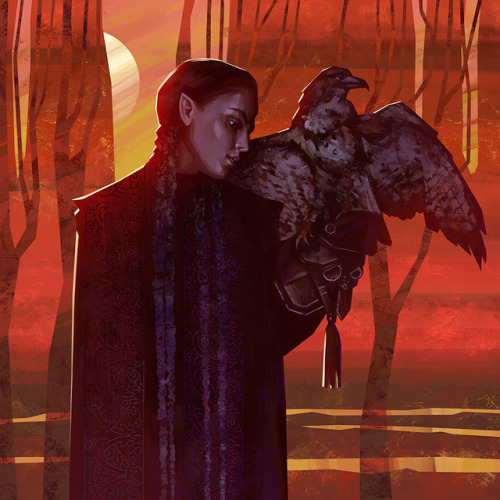
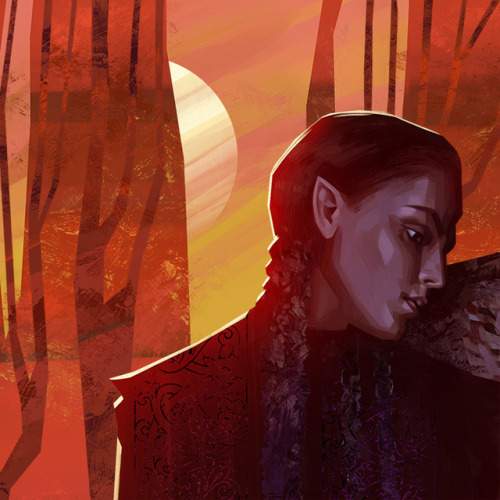
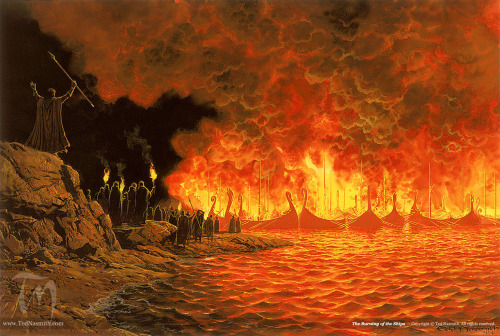

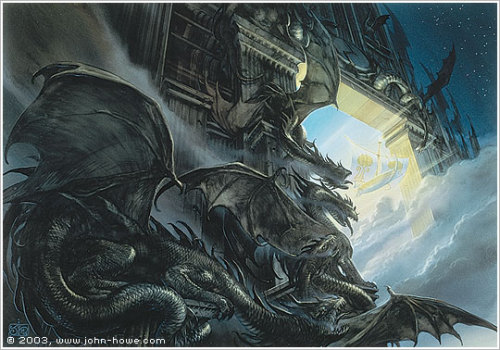
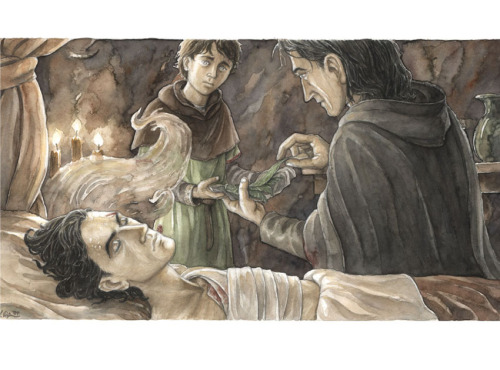

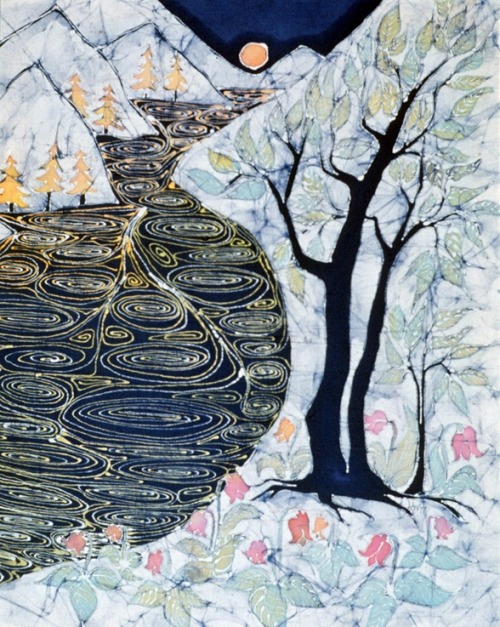


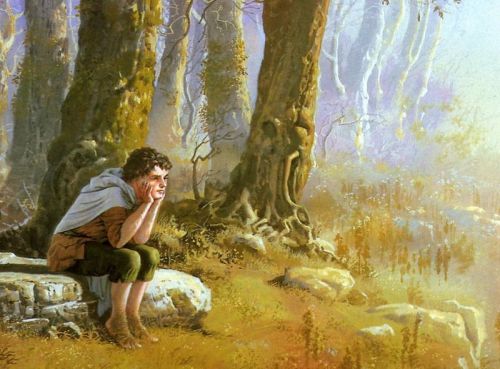
![On a time of autumn he came in the dusk of evening, and drawing near [Gorlim] saw as he thought a li On a time of autumn he came in the dusk of evening, and drawing near [Gorlim] saw as he thought a li](https://64.media.tumblr.com/tumblr_m8zsyrCvO21rtwlb5o1_500.jpg)
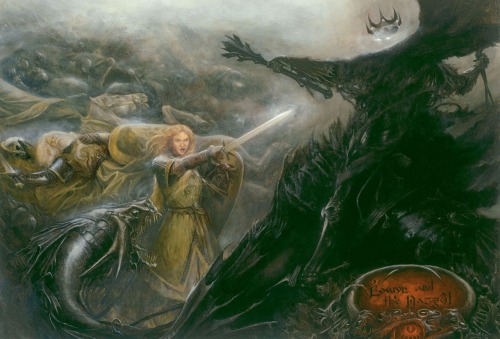
![“But the last-comer [of the Istari] was named among the Elves Mithrandir, the Grey Pilgrim, fo “But the last-comer [of the Istari] was named among the Elves Mithrandir, the Grey Pilgrim, fo](https://64.media.tumblr.com/tumblr_m8p5zgccBK1rtwlb5o1_500.jpg)


